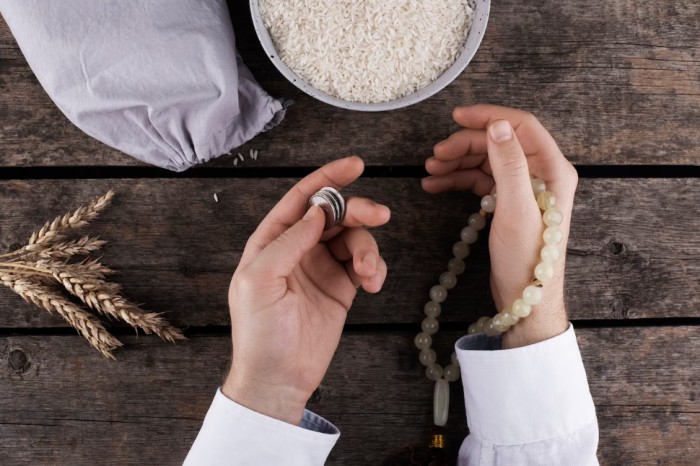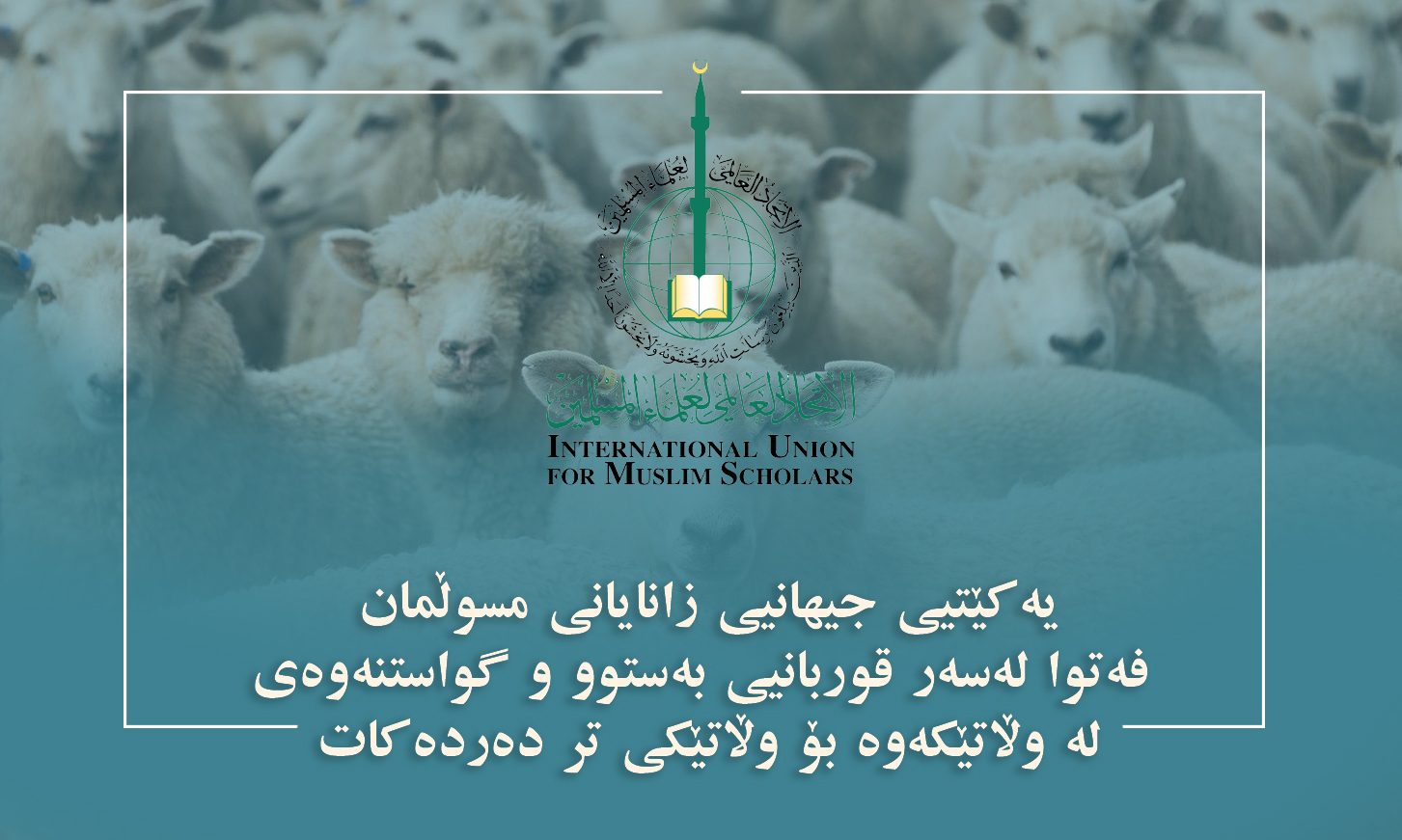Aug 01 2025

Zakat al-Fitr... Its Rulings, and the Validity of Giving it in Cash
By: Prof. Dr. Ali Muhiddin al-Qaradaghi
Secretary-General of the International Union of Muslim Scholars
President of the Human Appeal Organization
Islam is the religion of mercy. It is merciful in its laws and its Sharia rulings; it is a religion of mercy in dealings, contracts, justice, and transactions.
The mercy of Allah the Almighty towards His servants is evident in how He has tied all the pillars of Islam to bringing joy to the destitute, the poor, and the needy. Zakat—the third pillar of Islam—was legislated to alleviate or completely remove the pain and burden of poverty and unemployment from people, by participating in a just redistribution of income. For the pillar of Hajj, Allah the Almighty has prescribed the sacrificial offerings of Mecca (hadi), sacrifices (udhiyah), redemptions (fidyah), and expiations (kaffarah) to assist the poor in meeting their needs, lifting them from the circle of poverty into the circle of self-sufficiency or near self-sufficiency.
Allah the Almighty has made Zakat al-Fitr an obligation upon every Muslim, rich and poor, young and old, as long as they have the ability to give it. Ibn Umar said: "The Messenger of Allah (peace be upon him) enjoined Zakat al-Fitr as one Sa' of dates or one Sa' of barley upon the slave and the free, the male and the female, the young and the old among the Muslims, and commanded that it be given before the people go out to the (Eid) prayer." (Narrated by Bukhari in Fath al-Bari, 3/367, Muslim, 2/677, and all authors of the Sunan collections; this is a matter of consensus with no disagreement).
The wisdom behind its obligation becomes clear in the hadith of Ibn Abbas, which Abu Dawud narrated with a good chain in his Sunan (no. 1609), as did al-Daraqutni (2/327) and al-Hakim in his Mustadrak. Al-Hafiz al-Mundhiri said its chain is authentic or good, and Ibn al-Mulaqqin authenticated it in his commentary on Bukhari (10/636), where Ibn Abbas said: "The Messenger of Allah (peace be upon him) enjoined Zakat al-Fitr as a purification for the fasting person from idle talk and obscenities, and as food for the needy. Whoever gives it before the prayer, it is an accepted Zakat, and whoever gives it after the prayer, it is a form of charity."
Therefore, in light of this authentic and established hadith, the Prophet (peace be upon him) clarified that the wisdom behind giving Zakat al-Fitr is for two purposes:
First Matter: Zakat al-Fitr purifies the fasting person from excessive and meaningless speech, as well as from arguments that cross the line. Al-Nawawi, in his book al-Majmu', narrates from Waki' ibn al-Jarrah that he said: "Zakat al-Fitr for the month of Ramadan is like the two prostrations of forgetfulness (sujud al-sahw) for the prayer. Just as the prostration rectifies the shortcomings of the prayer, Zakat al-Fitr rectifies the deficiencies of the fast."
Allah the Almighty has clarified the wisdom of giving all types of Zakat, which is for purification and cleansing. Allah says: "Take, [O, Muhammad], from their wealth a charity by which you purify them and cause them increase, and invoke [Allah's blessings] upon them. Indeed, your invocations are a source of security for them. And Allah is Hearing and Knowing." (At-Tawbah: 103). It purifies the soul of the Zakat giver from any form of greed and avarice, and it purifies the soul of the one who receives the Zakat from hatred, malice, envy, and resentment towards the wealthy. It is also a means for comprehensive development.
Second Matter: Fulfilling the needs of the poor on the day when Muslims are joyful and the wealthy are generous. This allows the poor to share in their joy, as they are given enough from the wealth and property of others to meet their needs.
Along with these two wisdoms, there are two others:
a) Making the poor self-sufficient so they do not have to beg on the day of Eid. It is narrated from the Prophet (peace be upon him) that he said: "Make them self-sufficient from going around and begging on this day." (Narrated by al-Bayhaqi in Al-Sunan al-Kubra, 4/175). Its chain contains Abu Ma'shar Najih al-Madani, who is a debated narrator, so it has been deemed weak. However, al-Hafiz Ibn Hajar in Al-Dirayah (1/274), after stating its chain is weak, said: "Its basis is in the two Sahihs from Ibn Umar."
b) Expressing gratitude for the blessing of health, life, and the good fortune of completing the fast of Ramadan.
How is Zakat al-Fitr Given?
A person who is able to give it does so on behalf of himself, his wife, and his young children. As for adult children, if they are wealthy, they must give it themselves. If they are poor, the stronger opinion among scholars is that the father gives it on their behalf, as mentioned in the hadith of Ibn Umar that: "The Messenger of Allah (peace be upon him) commanded the giving of Zakat al-Fitr on behalf of the young and the old, the free person, and also on behalf of those slaves for whom he provides." Many hadith scholars have considered this narration with this specific wording to be weak. However, al-Albani in Irwa' al-Ghalil (no. 839) considered the wording "Give Zakat al-Fitr on behalf of those for whom you provide" to be good (hasan).
The Amount of Zakat al-Fitr
The Prophet (peace be upon him) specified the amount as one Sa' of dates or one Sa' of barley, as in the hadith of Ibn Umar found in the two Sahihs. Abu Sa'id al-Khudri said: "We used to give Zakat al-Fitr as one Sa' of food, or one Sa' of barley, or one Sa' of dates, or one Sa' of dried yogurt (aqit), or one Sa' of raisins." (Narrated by Bukhari, no. 1056). In another narration by Bukhari (no. 1058), the wording is: "During the time of the Prophet (peace be upon him), we used to give Zakat al-Fitr as one Sa' of food..." In a third narration (no. 1510), the wording is: "During the time of the Messenger of Allah (peace be upon him), on the day of Eid, we used to give Zakat al-Fitr as one Sa' of food, or dried yogurt, or dates." Abu Sa'id said: "And our food was barley and raisins."
The jurists agree that giving half a Sa' of the four types mentioned in the hadith of Abu Sa'id al-Khudri is not sufficient for Zakat al-Fitr. The majority of scholars (Maliki, Shafi'i, and Hanbali) hold the same view that half a Sa' of wheat or similar grains is not sufficient. However, the Hanafis permit Zakat al-Fitr to be fulfilled with half a Sa' of wheat. This is based on the hadith of Abu Sa'id al-Khudri who said: "Mu'awiyah came for Hajj or Umrah, and he addressed the people from the pulpit. Among the things he said to the people was: 'I see that two mudds (half a Sa') of the brown wheat of Sham is equivalent to one Sa' of dates.' And the people acted upon it. But as for me, I will continue to give it as I used to for as long as I live." (Narrated by Bukhari in Fath al-Bari, 3/372, and Muslim, 2/678, hadith no. 985).
The opinion of Mu'awiyah (may Allah be pleased with him) was based on the view of the Rightly-Guided Caliph Umar al-Faruq (may Allah be pleased with him). Muslim in Al-Tamyiz al-Hadith (no. 181) and Abu Dawud in his Sunan (no. 1614) narrated with a good chain from Ibn Umar that he said: "During the time of the Prophet (peace be upon him), the people used to give Zakat al-Fitr as one Sa' of barley, or dates, or... or raisins. Abdullah said: When wheat became abundant during the time of Umar, Umar made half a Sa' of wheat equivalent to one Sa' of those things mentioned." Ibn al-Humam in Sharh Fath al-Qadir (2/300) said: "(The chain is affected by Ibn Abi Rawwad, whom Ibn Hibban criticized, but more than one person has authenticated him, and those who authenticated him are more knowledgeable of him). For this reason, Abu Dawud remained silent about it, which means it is a good (hasan) hadith according to his methodology. However, al-Albani classified it as weak in his collection of weak hadiths of Abu Dawud (no. 1614) and said: "(Umar and others have been mentioned, but the most authentic of them is that of Mu'awiyah)."
The Amount of a Sa' in Modern Times
In our time, a Sa' is equivalent in weight (grams) to approximately two and a quarter kilograms (2.25 kg). It is not more than this amount, though it varies slightly from one type of grain to another based on density. Therefore, giving two and a quarter kilograms per person of the types mentioned in the previous hadiths, or of rice, is legislatively valid and, God willing, is certainly sufficient and accepted.
Today, this is equivalent to 15-20 Qatari Riyals. So, whoever gives 15 Riyals, it is sufficient, but if they give 20 Riyals, it is better. Each country should evaluate this amount (2.25 kg) according to its common staple food and its own currency and act accordingly.
The Place of Giving Zakat al-Fitr and the Validity of Transferring It When Needed
The place for giving Zakat al-Fitr is the location and region where the Muslim lives. As for Zakat on wealth, it is tied to its location. It is permissible to transfer it in the following cases, as stated in a fatwa issued by the International Council for Contemporary Zakat Issues:
First: The principle regarding the distribution of Zakat is that it should be distributed in the place where the wealth from which Zakat is due is located—not the Zakat giver. It is permissible to transfer Zakat for a strong, legitimate interest from its location.
The following are some of the interests for which Zakat may be transferred:
a) Transferring it to places where jihad in the cause of Allah is being waged.
b) Transferring it to dawah (proselytizing), educational, or health institutions that are eligible to receive Zakat as one of the eight categories.
c) Transferring it to areas where people are starving, and to disaster-stricken areas that some Muslims in the world have been afflicted with.
d) Transferring it to the close relatives of the Zakat giver who are eligible for Zakat.
Second: Transferring Zakat to other places, apart from the previous cases, does not prevent the Zakat from being valid, though it is disliked (makruh), provided that it is given to those who are eligible for Zakat and fall within the eight categories.
Third: The "homeland" of Zakat includes the city and the nearby villages, as well as the areas belonging to that municipality that are less than (approximately 82 km) away, as these places fall under the ruling of a single city.
Fourth: The location for Zakat al-Fitr is the location of the person giving it, because it is the Zakat of the body.
Fifth: Matters permitted in cases of transfer:
a) Expediting the payment of Zakat on money at the end of the year by a period that allows it to reach the deserving recipients by the completion of the year, provided the conditions for the obligation of Zakat are met. Zakat al-Fitr should not be advanced to the beginning of Ramadan.
b) Delaying the payment of Zakat for the period required for its transfer.
Time of Giving
The purpose and wisdom of Zakat al-Fitr are to fulfill the needs of the poor so that they can share in the joys of Eid day with the wealthy. Therefore, Ibn Umar used to give Zakat al-Fitr one or two days before Eid. Abu Dawud narrated with an authentic chain (no. 1610) that: "Ibn Umar used to give Zakat al-Fitr one or two days before the day of Eid." Al-Albani also said in Sahih Abi Dawud: "(An authentic hadith)." It is well-known that Ibn Umar was the most stringent of all the companions in following the Sunnah and emulating the Prophet (peace be upon him), yet despite this, he gave Zakat al-Fitr one or two days before Eid so that the poor could benefit from it, because if it is given on the same day as Eid, the poor cannot benefit from it as needed.
Subsequently, the jurists differed. A group of jurists, including Ibn Umar, the Malikis, and the Hanbalis, are of the view that it is permissible to give Zakat al-Fitr one or two days before Eid (See: Bulghat al-Salik 1/201, Kashshaf al-Qina' 1/471). The Shafi'i school holds that the time for giving Zakat al-Fitr is before the Eid prayer, but it is also permissible to advance it to the beginning of the month of Ramadan until its end (See: Rawdat al-Talibin 2/292). The Hanafis believe that the time for giving Zakat al-Fitr is wide and open, because it is an obligation with an unrestricted time frame. One can give it whenever they wish, and they are not compelled to a specific time, but it is better to give it before going to the Eid prayer (See: Rawdat al-Talibin 2/292). However, the vast majority of scholars, including Hasan ibn Ziyad from the Hanafi school, believe that the time for giving Zakat al-Fitr ends with the end of the day of Eid. (See the previous fiqh sources and the Kuwaiti Fiqh Encyclopedia).
The Sharia Ruling on Giving Zakat al-Fitr in Cash
Jurists, both past and present, are divided into three opinions:
First Opinion: It is not permissible under any circumstances to give Zakat al-Fitr in cash. Rather, one must give a Sa' of the staple food of the majority of the city's population, or half a Sa' of wheat according to some. This is the practiced madhhab of the Malikis, Shafi'is, and Hanbalis. (See: Bada'i' al-Sana'i' 2/205, Hashiyat Ibn Abidin 2/79, Al-Sharh al-Kabir ma'a al-Dusuqi 1/805, Nihayat al-Matlab 3/420, Al-Rawdah 2/301, Mughni al-Muhtaj 3/116, Al-Furu' 2/540). The Zahiri school holds the same opinion, even stating that it is not permissible except with dates and barley (See: Al-Muhalla by Ibn Hazm 6/118).
Second Opinion: It is absolutely permissible to give it in cash in all circumstances. This is the madhhab of Abu Hanifa and Abu Yusuf. Abu Ja'far al-Tahawi, a jurist and hadith scholar trusted by the Hanafis, acted upon this opinion. It is also narrated from Sufyan al-Thawri, Umar ibn Abd al-Aziz, Hasan al-Basri, and others. There is also a narration from Ahmad that this opinion can be acted upon in cases of necessity or strong benefit. This is the opinion of the vast majority of contemporary scholars, as well as the International Council for Contemporary Zakat Issues, and the opinion of the former Sheikh of Al-Azhar, Sheikh Mahmud Shaltut, and Sheikh Yusuf al-Qaradawi. (See the previous fiqh sources).
Ibn Abi Shaybah narrated in his Musannaf from Qurra who said: "A letter from Umar ibn Abd al-Aziz reached us regarding Zakat al-Fitr, that it is half a Sa'—meaning of wheat—per person, or its value of half a dirham." Hasan [al-Basri] said: "There is no harm in giving one dirham in place of Zakat al-Fitr." Abu Ishaq said: "I found them giving the price of the food in dirhams instead of giving Zakat al-Fitr." (See: Musannaf Abi Shaybah 3/174).
Imam al-Sarakhsi said: "The jurist Abu Ja'far (may Allah have mercy on him) used to say: 'Giving the value is better because it is more beneficial to the poor. He can buy what he needs with that value.' The discussion was about wheat and barley because buying and selling in Medina at that time was done with them. But in our regions and countries, buying and selling was done with money, which is the most beloved of wealth, and giving Zakat al-Fitr with it is better." He even attributed this previous statement to Abu Yusuf and said: "Dirhams are better and preferable to flour because they better fulfill the needs of the poor and are quicker. Likewise, flour is better than wheat." (See: Al-Mabsut 2/149).
Third Opinion: The principle is that Zakat al-Fitr should be given as a Sa' of food, but due to a strong interest, or the need to give its value, or in other words, if cash is better for the poor than food.
This is the opinion of Abu Ishaq al-Ruhawayh and Abu Thawr. It is mentioned in the Fiqh Encyclopedia of Sufyan al-Thawri that: "If the value of the foodstuff is given in money, it is more beneficial to the poor and is permissible, because the purpose is to make the poor self-sufficient from begging and to fulfill their needs on this day." This is also the preferred choice of Sheikh al-Islam Ibn Taymiyyah. (See: Mawsu'at Fiqh Sufyan al-Thawri, p. 473).
The Proofs of the Fiqh Schools
First: The scholars who prohibit giving Zakat al-Fitr in cash have these proofs:
The authentic and sound hadiths that tell us the Messenger of Allah (peace be upon him) specified Zakat al-Fitr as a Sa' of dates, etc. He did not mention its value in money, which he would have done if it were permissible. Accordingly, whoever gives the value of the foodstuff has not followed the command of the Prophet (peace be upon him).
Giving Zakat is an act of worship and drawing near to Allah the Almighty. Therefore, the principle and obligation are to obey and follow, not to innovate. In fiqh terminology, Zakat al-Fitr is a devotional act and is not subject to analogy and ijtihad.
These are the most important proofs relied upon by those who prohibit giving Zakat al-Fitr in cash, both past and present. However, this issue can be debated as follows:
a) What is mentioned in the noble hadiths of the Prophet (peace be upon him) is that he prescribed one Sa' of dates, etc. This is the companion's formulation of the fact that the Prophet (peace be upon him) made Zakat al-Fitr obligatory; it is not the Prophet's own wording in a way that implies a restriction from giving it in other forms. We have no established and explicit text from the Prophet (peace be upon him) indicating that Zakat al-Fitr is restricted to a Sa' in all the hadiths that have come on this matter. The greatest proof is that all the prohibiting scholars permit giving one Sa' of wheat for Zakat al-Fitr, even though this is not mentioned by consensus in the authentic and explicit hadiths. Also, the majority permit giving one Sa' of rice for Zakat al-Fitr, which is not mentioned in any hadith, neither authentic nor explicit.
If this analogy is correct and acceptable, then what is the difference between it and making ijtihad on the permissibility of giving Zakat al-Fitr in cash? In fact, specifying the value of dates or barley, which are mentioned in the text, is closer than attaching other types of grains to them that are not mentioned in the texts of the Sharia.
b) In reality, Zakat in general, and Zakat al-Fitr in particular, are not among the purely ritualistic acts of worship. Rather, they are acts of worship that fall within the realm of rationally comprehensible meanings where ijtihad can be made. We have seen that all the prohibiting scholars have made ijtihad, then they made an analogy regarding wheat or rice or the like, as long as it represents the staple food of the city.
In this way, their proof is turned back against them, because they did not adhere to the idea that it is a purely devotional act in which there is no analogy. If this analogy, in which ijtihad was made, is correct, then why is it not permissible to make ijtihad that it is permissible to give it in cash?
c) Furthermore, what is mentioned in the hadith of Ibn Umar that Zakat al-Fitr is with dates, barley, and dried yogurt, is a mention of the types of food of that era. The proof is that when other types came into the picture, they were relied upon, as Abu Sa'id al-Khudri said regarding wheat.
Second: The scholars who permit giving Zakat al-Fitr in cash have relied on these proofs:
The legislation of Zakat al-Fitr and the intention of the Sharia behind it is to satisfy, bring joy to, and make the poor self-sufficient from begging on the day of Eid, and to bring happiness to their hearts by providing their basic needs. This is certainly achieved in our era mostly through money, so that they can buy their basic necessities which are not limited to dates, wheat, barley, rice, and the like.
The noble companions had this understanding of Zakat al-Fitr, as they were not restricted only to what the Prophet (peace be upon him) had decided upon in his time regarding dates, barley, and dried yogurt, but they also added wheat. In fact, most of them equated half a Sa' of wheat to one Sa' of dates or barley—as previously mentioned.
In reality, the greatest proof is the opinion of Mu'awiyah (may Allah be pleased with him) which he proposed to the noble companions during his Hajj or Umrah, that half a Sa' of the brown wheat of Sham is equivalent to one Sa' of dates, as the noble companion Abu Sa'id al-Khudri and others say, and the companions agreed to it.
Therefore, their consensus is strong evidence for the permissibility of giving it in cash, because equating half a Sa' of wheat with one Sa' of dates cannot be achieved except through its value. This equation has been narrated from Umar (may Allah be pleased with him)—as mentioned earlier.
It is established in authentic and sound Sharia texts that the Prophet (peace be upon him) and the Rightly-Guided Caliphs accepted money in place of Zakat from certain individuals in several cases, such as accepting dirhams and dinars in place of the difference in the required age for Zakat on camels, where the remainder was estimated at two sheep or twenty dirhams.
Also, when the Prophet (peace be upon him) sent Mu'adh to Yemen to collect the obligatory Zakat, Mu'adh told them: "Bring me the value in cloth, either khamis or labis, it is easier for you and better for the Muhajirun and Ansar in Medina." (Narrated by Bukhari in the chapter on Zakat). Tawus said: "Mu'adh told the people of Yemen: 'Bring me the value in cloth, either khamis or labis, instead of Zakat in place of barley and corn, it is better for you...'" (Narrated by al-Bayhaqi in Al-Sunan al-Kubra 4/113, and Al-Muhalla 6/25). Al-Hafiz Ibn Hajar narrated it in Ta'liq al-Ta'liq 3/13 with an authentic chain from Tawus, but he did not hear from Mu'adh, so it is disconnected. Ibn Abi Shaybah also narrated it in his Musannaf 3/174.
They have several other proofs which there is no space to mention here.
Third Opinion: The proof for this opinion is the same as the proof for the second opinion (the permitters), with the condition of a strong benefit. Accordingly, with the consideration of this condition, giving it in cash is acted upon.
The Stronger Opinion
After presenting these proofs to the best of my ability, and after many discussions on this issue which time did not allow us to present in full, it has become clear to me that the second opinion is stronger, reinforced by what the proponents of the third opinion have said, which is that giving it in cash is more beneficial to the poor. Accordingly, if giving it in food and grains is more beneficial, then that is the original principle. Allah the Almighty knows best, and this is in light of the following:
First: There is no disagreement among the jurists that it is permissible to act upon the apparent meaning of the texts and give a Sa' of the common food of the city or of what the noble hadith mentioned (according to the previous details).
Second: Since the disagreement on giving Zakat al-Fitr in cash is a very strong disagreement, it should not be criticized. Whoever acts upon a certain opinion, their action should not be rejected, and none of the opinions should be deemed wrong, because it is a permissible disagreement. Every Muslim has the right to consult his conscience in acting upon the opinion of the prohibitors or the permitters. Preachers and speakers in mosques should not raise this issue in sermons and admonitions in order to avoid creating problems or commotion among Muslims, because the pulpits are not places for raising contentious issues. This is the way of our pious scholars: to accept and respect permissible differing opinions, even if one opinion differs from another.
Third: Certainly, this religion is founded upon ease and the removal of hardship in matters of giving, receiving, dawah, and fatwa. Therefore, giving Zakat al-Fitr in cash is easier than giving it in dates, barley, wheat, and the like. There is a kind of hardship and difficulty in all the Zakat al-Fitr that is given in wheat, dates, or rice in large cities in our time. This is in addition to the fact that if it is given in these foods today, all of them will go and sell it to buy their other needs with its price. On the other hand, we see that the methodology of the Prophet (peace be upon him) in giving Zakat and other matters was founded on making things easy for people. Therefore, whoever does not have the original item from which Zakat is due, its substitute is accepted, or the difference is taken, as is the case in the Zakat of camels.
Fourth: The objectives of the Islamic Sharia in Zakat al-Fitr are clear, which is to fulfill the needs of the poor. There is no doubt that today's needs are not only for eating dates and bread from wheat or rice but are many and varied. Therefore, money achieves these objectives better. Thus, it deserves to be approved and accepted, if giving it in cash is not even better. It is well-known that the Sharia is built upon the consideration of benefits in all their forms.









